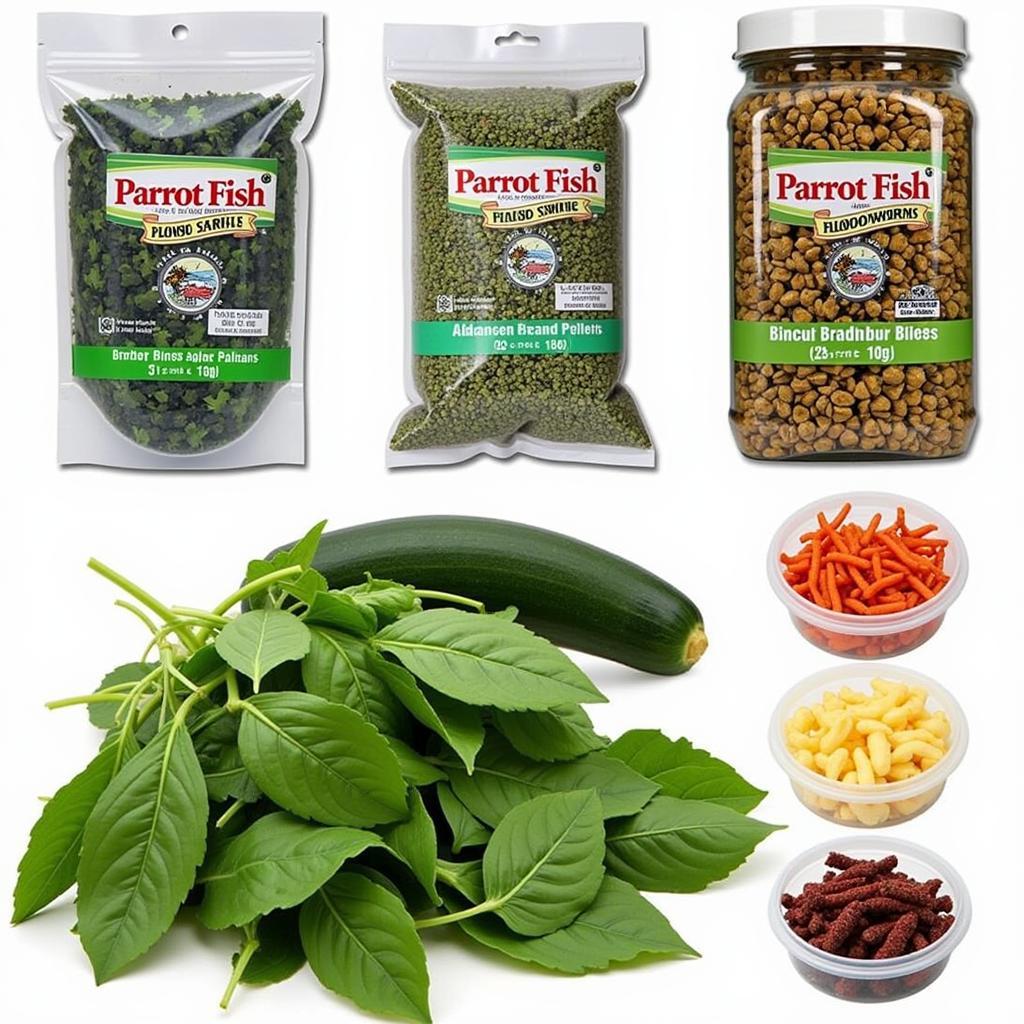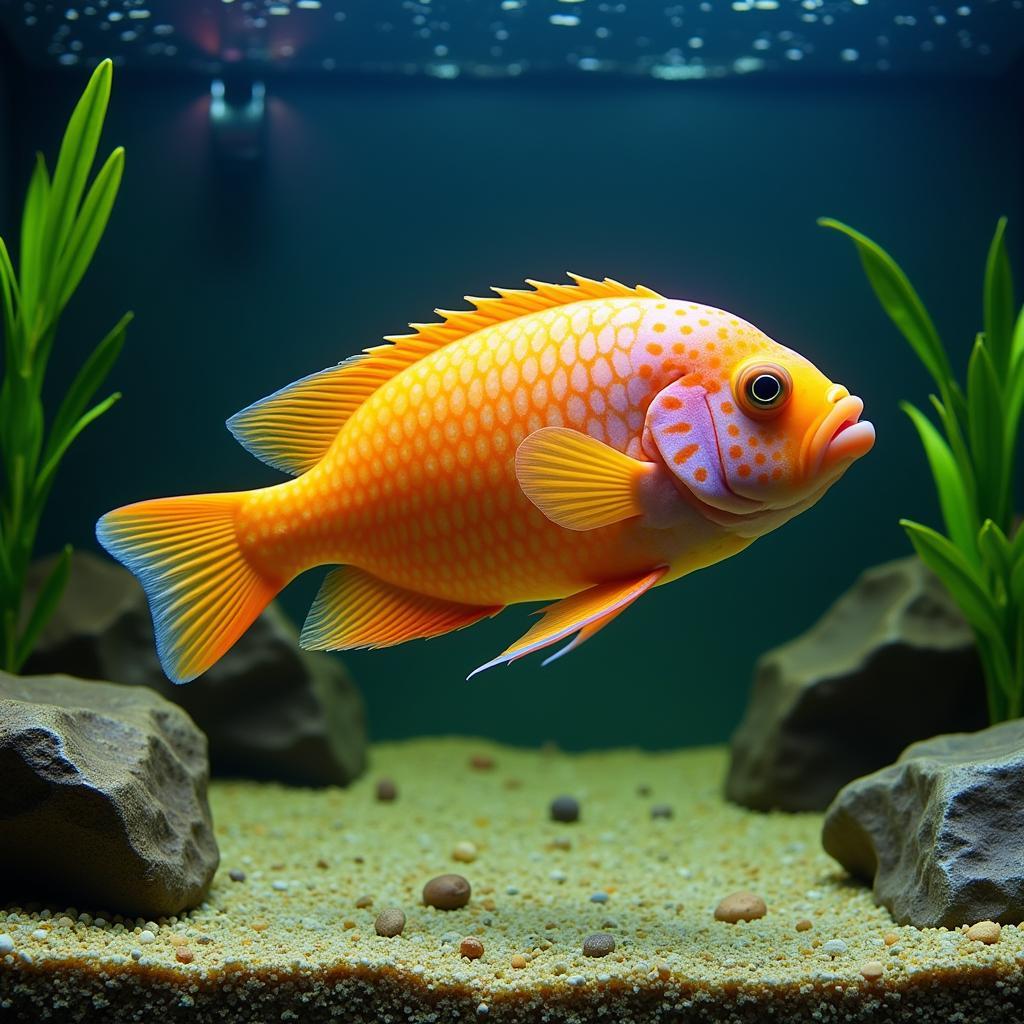Parrot fish are known for their vibrant colors and playful personalities, making them a popular choice for aquarium enthusiasts. But did you know that their diet plays a crucial role in maintaining their health and that stunning coloration? That’s right, choosing the right Parrot Fish Food can be the difference between a dull-colored fish and one that truly pops. In this comprehensive guide, we’ll dive deep into the world of parrot fish nutrition, exploring the best food options to keep your finned friend happy and thriving.
Understanding the Parrot Fish Diet: What Do Parrot Fish Eat in the Wild?
Before we delve into specific food recommendations, let’s first understand the natural diet of parrot fish. In their natural coral reef habitats, parrot fish are primarily herbivores, with their diet consisting mainly of algae. They graze on algae growing on rocks and coral, using their beak-like teeth to scrape it off. This grazing behavior is not only essential for their nutrition but also plays a vital role in the health of the coral reef ecosystem.
The Importance of Algae in a Parrot Fish Diet
Algae provide parrot fish with essential nutrients, including vitamins, minerals, and fiber. Here’s why algae should be a staple in your parrot fish’s diet:
- Color Enhancement: The pigments in algae, particularly spirulina and chlorella, contribute to the vibrant colors that make parrot fish so visually appealing.
- Digestive Health: The high fiber content in algae aids in digestion and helps prevent constipation, a common issue in parrot fish fed a diet lacking in plant matter.
- Overall Well-being: A diet rich in algae ensures your parrot fish receives the full spectrum of nutrients needed for a strong immune system, healthy growth, and an active lifestyle.
Best Parrot Fish Food: Choosing the Right Options
Now that we understand the importance of algae, let’s explore the best parrot fish food options available:
1. Algae-Based Flakes and Pellets: The Foundation of a Healthy Diet
High-quality algae-based flakes and pellets should form the foundation of your parrot fish’s diet. Look for products that list spirulina, chlorella, or other algae sources as the primary ingredient.
Tips for Choosing Flakes and Pellets:
- Check the Ingredients: Avoid products with fillers, artificial colors, and preservatives.
- Consider Size and Shape: Choose flake sizes appropriate for your fish’s mouth size. Pellets that sink slowly are ideal, allowing your parrot fish time to graze.
- Variety is Key: Offer a mix of flake and pellet sizes and brands to provide nutritional variety.
2. Fresh Vegetables: A Nutritious and Enriching Treat
Supplement your parrot fish’s diet with fresh vegetables for added nutrition and enrichment.
Suitable Vegetables for Parrot Fish:
- Blanched Spinach
- Romaine Lettuce
- Zucchini
- Peas (shelled)
Tips for Feeding Vegetables:
- Blanch Hard Vegetables: Blanching softens vegetables, making them easier for your fish to digest.
- Remove Uneaten Portions: Remove any uneaten vegetables within a few hours to prevent water quality issues.
3. Occasional Treats: Live and Frozen Foods
While a primarily herbivorous diet is ideal, you can offer occasional treats of live or frozen foods for added protein and enrichment.
Suitable Treats:
- Brine Shrimp
- Bloodworms
- Mysis Shrimp
Tips for Feeding Treats:
- Moderation is Key: Offer treats sparingly to avoid digestive issues.
- Ensure High Quality: Choose reputable brands that are free from parasites and diseases.
 Variety of Parrot Fish Food
Variety of Parrot Fish Food
How Often Should I Feed My Parrot Fish?
Feeding frequency depends on the age and size of your parrot fish:
- Juveniles: Feed young parrot fish 2-3 times per day.
- Adults: Feed adult parrot fish once or twice a day.
Observe Your Fish: It’s always best to observe your fish’s eating habits. If they are consistently leaving food uneaten, you may be overfeeding.
Common Questions about Parrot Fish Food
Here are some frequently asked questions about feeding parrot fish:
Can parrot fish eat goldfish flakes?
While goldfish flakes might seem convenient, they lack the essential algae content that parrot fish require.
Do parrot fish eat coral?
While parrot fish graze on algae growing on coral, they don’t eat the coral itself. Their beak-like teeth are designed for scraping algae, not crushing coral skeletons.
Can I make my own parrot fish food?
While it’s possible to make homemade parrot fish food, it requires careful consideration of their nutritional needs. It’s generally recommended to rely on commercially prepared foods formulated by experts to ensure a balanced diet.
Creating a Thriving Aquarium Environment for Your Parrot Fish
Providing the right parrot fish food is essential, but it’s equally important to create a thriving aquarium environment.
- Tank Size: Parrot fish need ample swimming space. A tank size of at least 100 gallons is recommended for a single parrot fish.
- Water Parameters: Maintain stable water parameters, including temperature and pH, to mimic their natural coral reef habitat.
- Aquascaping: Provide plenty of hiding places and open swimming areas. Live rocks and caves can create a more natural and enriching environment.
 Healthy Parrot Fish in Aquarium
Healthy Parrot Fish in Aquarium
Conclusion: Investing in Your Parrot Fish’s Well-being
Choosing the right parrot fish food is an investment in your aquatic companion’s health, happiness, and vibrant colors. By understanding their dietary needs and providing a variety of high-quality food options, you can ensure your parrot fish thrives in your care. Remember, a healthy parrot fish brings joy and vibrancy to any aquarium.
Need help selecting the right parrot fish food? Contact us! We’re here to help you provide the best possible care for your finned friends.
Call: 02437655121
Email: [email protected]
Visit Us: 3PGH+8R9, ĐT70A, thôn Trung, Bắc Từ Liêm, Hà Nội, Việt Nam.
We have a 24/7 customer support team ready to assist you!